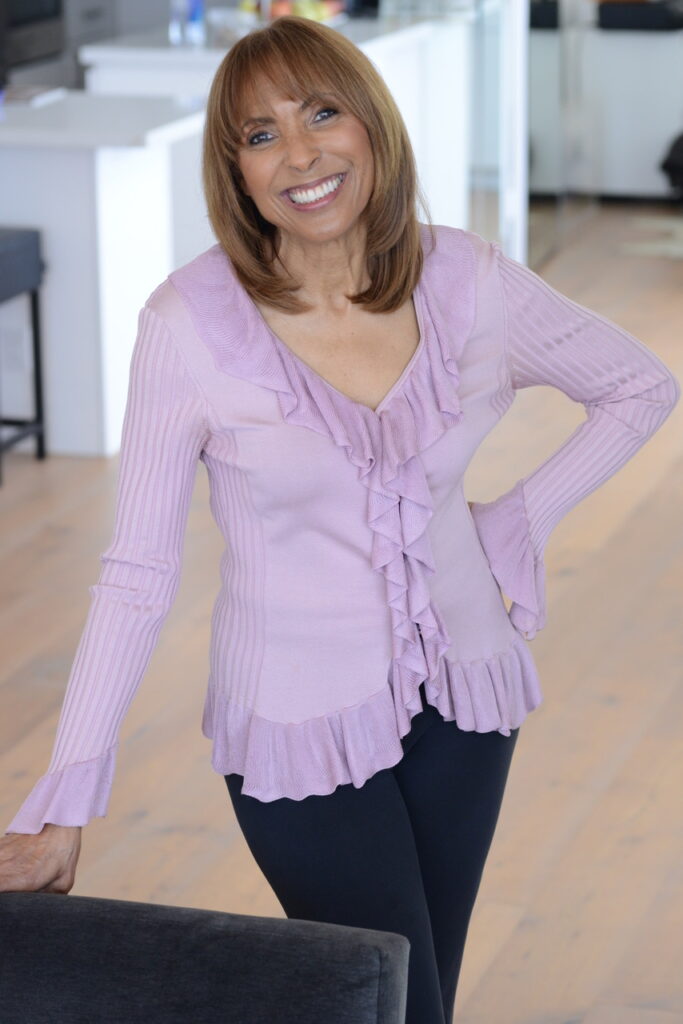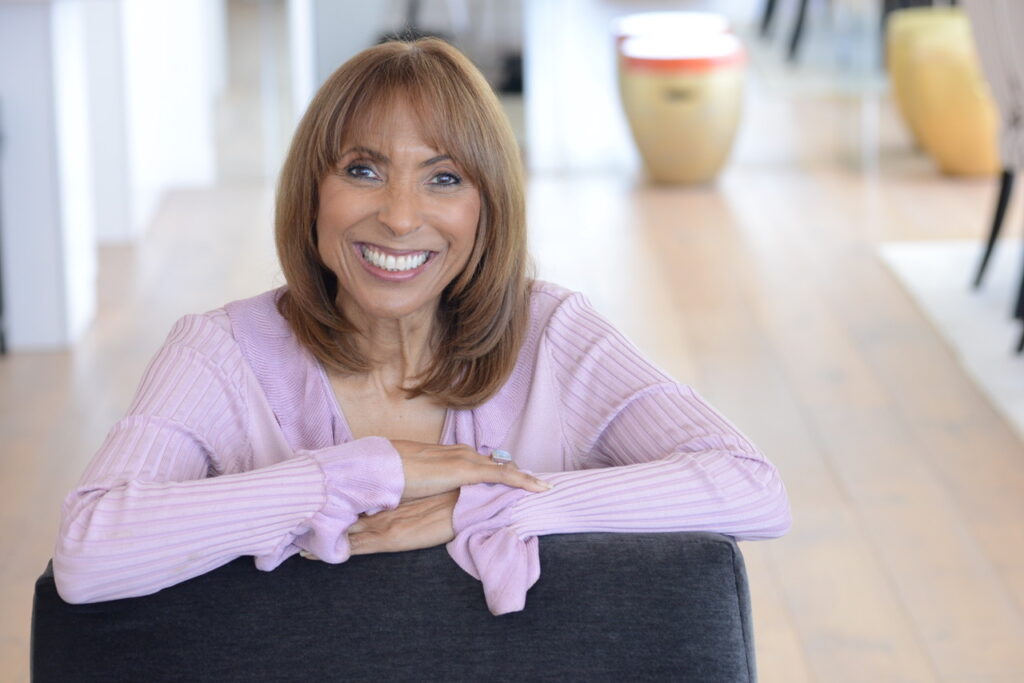Life Coach Renee Featherstone on How to Make Your Golden Years Truly “Golden”
In the introduction to her online “Awesome Aging 101” series, Los Angeles-based life coach, author, — and licensed hearing aid specialist! — Renee Featherstone writes “I want every woman to dance in her Super Powers. Come join me on the other side. I have a cape waiting for you.”
The “other side’ she references here is not the mystical realm of ancestors or the dear departed. It’s the other side of the common myths, well, make that outright lies, that contemporary American society lays on women of a certain age. “Getting old is an honor. It’s an honor to get here,” says Featherstone, “but our society treats it like a curse.”

Featherstone, whose work has included counseling teen girls in foster care settings as well as groups of incarcerated men, explains that trauma in some form is invariably the common denominator. The universal human experience, she explains, involves suffering. And, being Black adds its own vast dimension, referencing the phenomenon of inherited trauma which is just now being acknowledged by the mainstream medical establishment. She cites generations of pained Black women, mothers, Aunties, grandmothers, and other elders who passed their pain on to their children. And a harm that is so embedded in the society of the United States and further entrenched in Black spaces that Black people often seem convinced that bottomless pain with no end is an inherent part of their being Black.

While Featherstone acknowledges the mass experience of marginalization and chronic mourning, she offers a way out, a path to freedom. “It starts with forgiveness,” she says. “And this forgiveness begins with forgiveness of oneself. Traumatized people often believe that some piece of the trauma was their fault, and self-blame is what keeps the person in a state of suffering. Forgiveness is the key to freedom.”
Some survivors of trauma make a distinction between acceptance and forgiveness, but Featherstone says “Forgiveness is honoring ourselves because we are looking for our freedom. Forgiving the giver of pain is not letting them get a pass, and you’re not giving that person an excuse. But when we hold on to the pain, we’re all tied up in a knot.”
She cites Rachelle Ferrell’s “I Forgive You” as inspo. The lyric soars and slays with these words:
“I no longer want to hold onto that which doesn’t make me strong,
And I don’t really care if it’s right or wrong,
I just want to be whole again,
Want to be free again,
Want to be me again,
I just want to heal.”
Realizing that, as a survivor of trauma, be it inherited circa 1619 or more recent, or both, you secretly blame yourself in some way for what happened may take some digging. Featherstone says that often, conventional talk therapy is too cerebral, and too much like dishing with a good girlfriend over margaritas– the latter being comforting, but most likely not a venue for breakthrough progress.
She’s also skeptical on the therapeutic value of anger, once heralded as the silver bullet for recovering from trauma. “The expression of suppressed anger, including the primal screaming, writing the scathing letter that you don’t mail, beating and battering an inanimate object to release rage, all of that may help, and it can be cathartic. But if you stay in the anger, it’s extremely corrosive, and can make things worse.” She cites the road-rage so common on the freeways of Los Angeles, where even an unintentional trespass by another driver may send your blood-pressure soaring, as a demonstration of anger held in place.
The divine Nina Simone famously sang, “I Wish I Knew How It Would Feel to Be Free.” Featherstone says that this wishing, this desire to be free is the essence of all human experience. Blackness adds the dimension what she calls a sense of “lack,” distinguished from the experience of loss, which is more universal. “Lack in the Black experience often prevents us from developing our resilience,” she says. “The society at large teaches Black people that we are not good eough. Restrictions become ingrained, and we always watch our back. People who grow up in that lacking space are always seeking to earn love, and always seeking approval. And often, we become inhibited, afraid to give love because we anticipate rejection.”
She describes her own journey into the vibrant freedom of self-love as beginning in her late 30s. She rejected the Roman Catholic upbringing of her youth. “The message there was that I wasn’t good enough to talk to God directly, that I had to go through the priest and Saint this or Saint that. So then I visited different churches and none of them resonated, either,” until she found her way to the Science of Mind practice.
A more recent breakthrough came when visiting her daughter in Sweden, among what may be the whitest people on earth. “I didn’t feel the heaviness there,” she laughs. “Racial discrimination wasn’t an issue there.”
Featherstone’s passion is helping people to change their lives and fitting primarily older people with hearing aids is a life-affirming practice which, unlike therapy, produces results instantly (see our article on hearing aids, “We Hear Ya!”, elsewhere in this issue). Kleenex is always part of Featherstone’s office supplies, since “…either the patient or the patient’s family members tend to burst into tears when this person who has been struggling can suddenly hear.”
BELOW, Featherstone shares a few helpful exercises she uses in her coaching practice:
“If you’ve been living on this planet for over 50 years, I’d say there is at least a 97% chance you’ve experienced disappointment, physical or emotional pain, and/or betrayal by the actions of another human being. Your life experiences have shaped the way you respond to adversities and how you express your feelings. You may ignore, deny, hide, retaliate, or torture yourself or others to cope with the pain or fear that can be ever-present. These coping mechanisms can ultimately imprison you if you hold onto them too long. I speak from experience when I say, at some point, you have to free yourself from the bondage of these transgressions in order to truly live fully. This is where our coaching work together becomes transformational.
Here are a few quick exercises to begin moving you through the anger and pain so that you can get to the other side...
- Find a comforting mantra to bring calm to yourself. You can repeat it slowly and take deep breaths in between. For example you can say one of these or create one that resonates for you: “I am more than this.” “Everything unfolds for my highest and best good.” “I can stand in peace.”
- Ask your Inner-self, “Where is my gift in this?” and then let it go, knowing that our greatest gifts often come from our greatest adversities.
- Our bodies store emotional tension without us being aware of it. Try releasing the tension by lying down and progressively relaxing each muscle group individually. Tense the muscle as you inhale and release as you exhale.
- Another way to relax the body is with movement. Choose your favorite body movement and move. Whether it’s walking, yoga, cycling or my favorite – dancing. Solo dancing is a movement of freedom. No skill is needed and you can freely move your body any way it wants to go.
- Journaling provides a platform to explore your feelings in depth. It’s a great way to unravel the discomfort.”
#
Be the first to comment